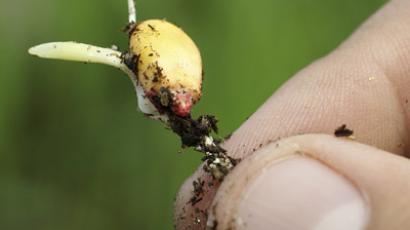The perfect drug? Monsanto hooks Nepal on GMO corn
The Nepalese government has teamed up with notorious agricultural giant Monsanto to force farmers use its GMO seeds. The strain, banned in several EU countries, will be used to substitute imports and boost the starving nation’s maize production.
Corn is one of Nepal’s biggest crops but the country produces only about half of what it needs for its feed industry, and imports some 130,000 tons annually to cover the deficit. Still, over 40 per cent of the Nepalese population is malnourished.The United States Agency for International Development (USAID) is lending the starving country a helping hand. More specifically the hand of Monsanto, an agricultural goliath which reaps as much controversy as it does seed.USAID announced last September that it wants to create a partnership with Monsanto and the Nepalese government to boost maize production.“We have been trying to help the Nepalese farmer to increase his total production of the food crops,” making him “a little bit more competitive by bringing his costs down,” said USAID Economic Growth Advisor Rave Aulakh.Soon after the initiative was introduced, public anger spilled onto both social media and the streets. Hundreds of protesters gathered in front of the US embassy in Katmandu to speak out against Monsanto.“You start buying seeds from them,” explained protester Sabin Ninglekhu. “Year one: it can produce a bit of yield. Year two: yield starts going down. And then it means you have to increase inputs. You have to annually buy seeds from this company because seed fertility keeps going down.”While most agree that Nepal must urgently address its food and security problems, critics say that the solution to Nepal’s agricultural problems should come from within the country, not from abroad.The ultimate goal of the protests was to put pressure on the government of Nepal to cancel its agreement with USAID and Monsanto before the consequences hit. They say the partnership will shift the country's dependence from imported maize to genetically modified seeds from abroad.Monsanto’s history is not exactly branded in glory. Allegations of monopolization of local markets follow the corporation, as it has been sued by hundreds of thousands of farmers around the globe.The latest lawsuit against Monsanto was filed last week in New Castle, Delaware. The suit claims that the corporation, "motivated by a desire for unwarranted economic gain,” knowingly poisoned Argentinian farmers that were pressured to use the company’s pesticides. The farmers insist that exposure to Monsanto’s chemicals caused an array of defects in local children.Some European countries also strongly oppose using Monsanto’s genetically modified seeds. Last month, the MON 810 strain of maize was temporarily banned in France“to protect the environment.” Poland also stated it will move to ban the strain completely. And last week, the European Commission failed to gather enough support to approve cultivation of three corn varieties developed by Monsanto.














